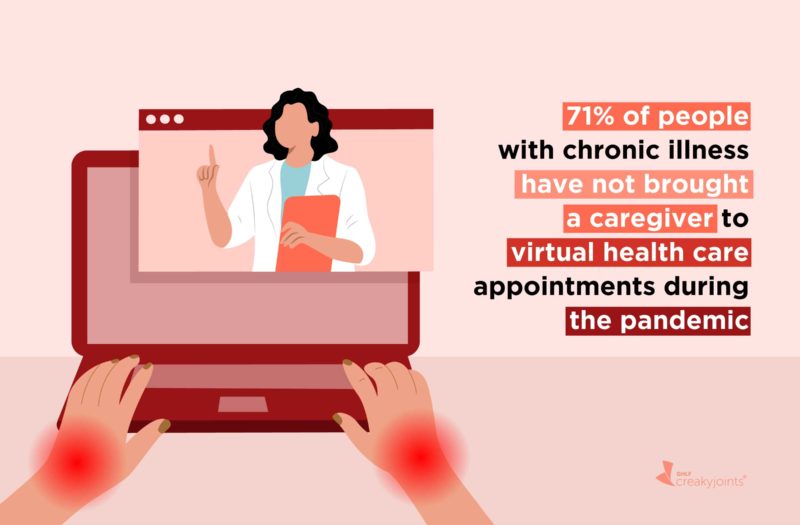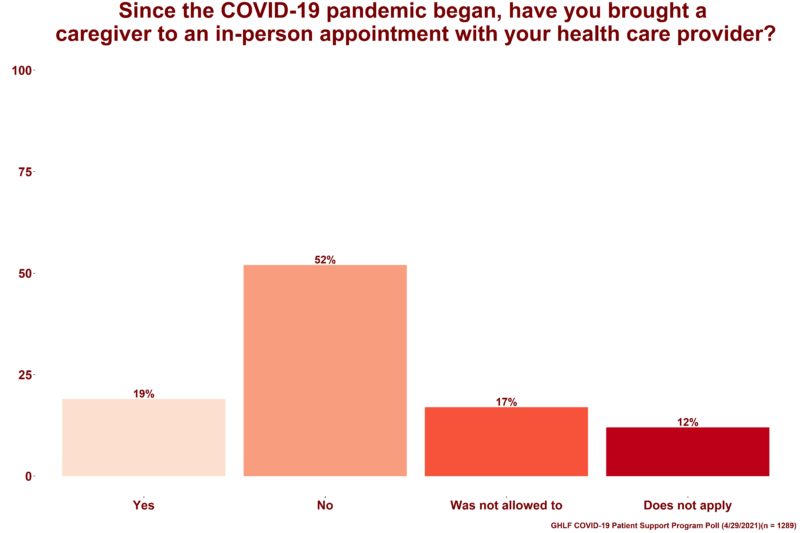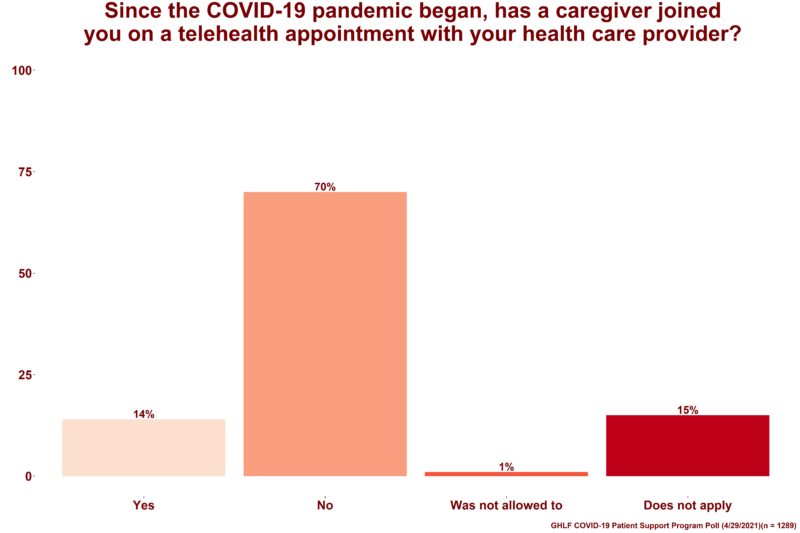Learn more about our FREE COVID-19 Patient Support Program for chronic illness patients and their loved ones.
Many people with chronic diseases enlist caregivers to help with the physical, mental, and emotional challenges that accompany their illnesses. This need for assistance has only increased during the COVID-19 pandemic, as an already vulnerable community has been put at an even greater risk. Since March 2020, people with chronic illnesses and their caregivers have had to learn how to navigate the pandemic and adjust to ever-changing safety recommendations.
One area where this has been particularly tricky is visits with health care providers. There are many benefits to bringing a caregiver to a doctor’s appointment; they are able to take notes, ask questions the patients may have forgotten, and further educate themselves on their loved one’s health condition. In short, caregivers provide extra security and support to ensure a successful visit. The pandemic immediately changed the role of caregivers at health care appointments, as the U.S. Centers for Disease Control and Prevention (CDC) asked non-emergency medical care providers to prioritize telehealth consultations and limited who could enter health care facilities for those rare in-person visits.
A recent poll of 1,298 people, conducted by the Global Healthy Living Foundation (GHLF) as part of its COVID-19 Patient Support Program, aimed to gain insight into the role caregivers have played in medical appointments — both in-person and telehealth visits — during the pandemic. The poll, which was conducted between April 29 and May 2, 2021, asked patients if their caregivers have joined them at medical appointments during the pandemic.
Here are some insights into the presence of caregivers at medical appointments during the pandemic.
Because of safety protocols, many patients could not or did not bring a caregiver to their in-person appointments
Given the CDC guidance that limited who could be at in-person appointments, it was not surprising that the majority of people surveyed did not have someone by their side for in-person visits. When asked if they brought a caregiver to any in-person appointments during the past year:
- 19% said yes
- 52% said no
- 17% said they weren’t allowed
- 12% said the question didn’t apply to them, as they likely do not use a caregiver regularly
Interestingly, of those who did not or were not allowed to bring a caregiver, only 22 percent of respondents said that they wanted one present.
Many patients did not bring a caregiver to their telehealth appointments, either because they didn’t feel the need or couldn’t coordinate schedules
Given how valuable caregivers can be during in-person visits, you might think that people would take advantage of telehealth and ask caregivers to attend virtual appointments. (Thanks to the wonders of technology, your caregiver doesn’t even necessarily have to live in the same house to attend a Zoom doctor’s appointment.) But when respondents were asked if they brought a caregiver to any telehealth appointments during the past year:
- 14% said yes
- 70% said no
- 1% said they weren’t allowed
- 15% said the question didn’t apply to them, as they likely do not use a caregiver regularly
Of those who did not or were not allowed to bring a caregiver, only 6 percent wanted one present. In the free response section of the poll, where patients could share general thoughts about caregivers attending health care appointments, many people noted that they couldn’t find a time that worked for both their health care provider and caregiver.
“My caregiver had to work and couldn’t join [a] telehealth appointment,” one person wrote.
Similarly, another patient wrote that, “my caregiver has a job and I would not expect them to take time off for a telehealth appointment.”
Other patients did not see as much need for a caregiver to attend their telehealth appointment.
“[My caregiver] helps ensure I get all the info the doctor gives me [in person], but with telehealth, I feel I have more time to take notes myself,” one patient wrote.
An Overall Theme: Caregivers Make Medical Appointments Less Stressful
Whether they have wanted to or been allowed to bring a caregiver to health care appointments during the pandemic, many people agreed in the free response section of the poll that that having another person present can make appointments easier and less stressful.
Caregivers Help You Remember the Details
Many patients acknowledge that caregivers help “fill in the gaps” during appointments, whether that means asking questions that may have been forgotten or acting as a “second set of ears.”
“As someone with a serious chronic condition, it is helpful to have a caregiver with me at appointments to make sure we cover everything necessary and to help me remember items to complete post-visit,” one person wrote.
Similarly, another person wrote that, “it’s important for patients to be able to have a caregiver with them if they want to so they can really understand what the goals are between them and the doctor.”
One respondent, who was diagnosed with lupus in July 2020, expressed how helpful it would have been to have a caregiver at their appointments. “I would have loved for someone to be with me,” they wrote. “I was overwhelmed hearing the word lupus. I missed a lot of information.”
Caregivers Can Ease Anxiety
Having another person present during a doctor’s appointment can also put patients’ minds at ease.
“Two heads are better than one, especially when anxiety about health-related concerns is present and important information is being communicated,” one patient shared.
“There have been several times during the pandemic where it would have lessened my anxiety to have a loved one with me,” another respondent wrote. “I had to have two surgeries where I had to wait completely alone, and it was horrible.”
“I want someone with me because doctors’ visits are very anxiety-provoking and you may not remember all that was said,” according to one patient.
Even Caregivers Feel the Stress of Not Being Able to Attend Appointments
Patients aren’t the only ones who have lost out during the pandemic. Many caregivers find it helpful to attend appointments, not only for their knowledge but for peace of mind.
One respondent shared a story about not being able to wait with their husband in the emergency department during a medical emergency.
“I had to wait for the nurse to call me to know what was going on. It was the worst ER visit ever,” they wrote. “The experience remains with me.”
That same caregiver experienced a similar situation in February 2021 following their husband’s aortic valve replacement. “I got to see my husband for five minutes in the recovery room and after that it was all by phone until his discharge,” they shared. “It is a lonely, stressful time for loved ones.”
It remains to be seen how long health care facilities may maintain limitations on the number of people who can attend in-person appointments. But if you are seeing your doctor for a telehealth visit and haven’t thought about asking a caregiver to attend with you, you may want to reconsider. Doing so may help your loved one learn more about your condition so they can better support you.
As the COVID-19 pandemic continues, it is important for patients and their loved ones to stay informed about the latest guidance and news. The Global Healthy Living Foundation is committed to providing ongoing education about COVID-19 news and how it pertains to the chronic illness and immunocompromised community. Follow all of our COVID-19 coverage here.
Get Free Coronavirus Support for Chronic Illness Patients
Join the Global Healthy Living Foundation’s free COVID-19 Support Program for chronic illness patients and their families. We will be providing updated information, community support, and other resources tailored specifically to your health and safety.
About the Patient Support Program Quick Poll
Members of our program have underlying health issues — such as inflammatory arthritis and other autoimmune conditions, heart disease, lung disease, diabetes, and more — that may increase their risk for COVID-19 complications. They are interested in understanding the best ways to stay safe during the pandemic and to be part of a community of people with similar concerns, questions, and fears.
Healthcare Facilities: Managing Operations During the COVID-19 Pandemic. The U.S. Centers for Disease Control and Prevention. March 17, 2021. https://www.cdc.gov/coronavirus/2019-ncov/hcp/guidance-hcf.html.








